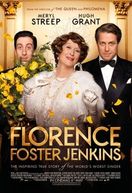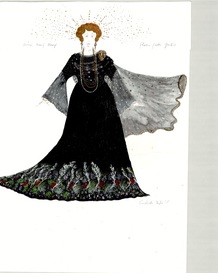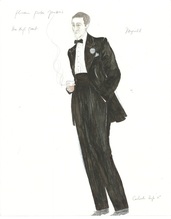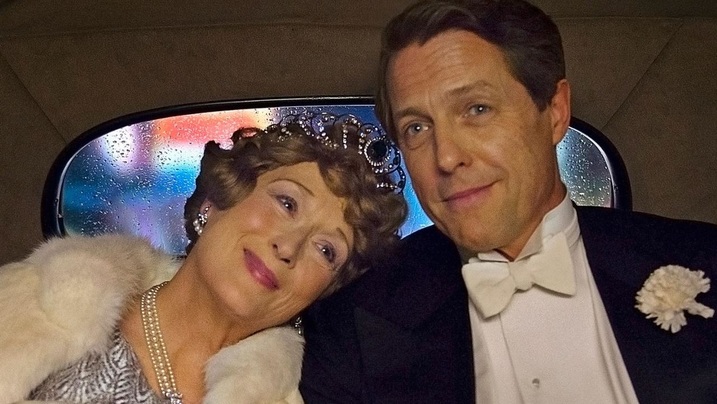 By Adam Ray Palmer Today, we have an interview with cast of Florence Foster Jenkins which is released today in the UK (6th May 2016). Stephen Frears (director), Meryl Streep and Hugh Grant team up for the first time on Florence Foster Jenkins, an inspirational, poignant, heart-warming comedy about love, music and the pursuit of dreams. We had the luxury of chatting to Meryl Streep, Hugh Grant and Big Bang Theory’s Simon Helberg a couple of weeks ago – and the below is what they said… THE NARRATIVE: Set in 1940s New York, Florence Foster Jenkins is the true story of the legendary New York heiress and socialite who obsessively pursued her dream of becoming a great singer. The voice she heard in her head was beautiful, but to everyone else it was hilariously awful. Her "husband" and manager, St. Clair Bayfield, an aristocratic English actor, was determined to protect his beloved Florence from the truth. But when Florence decided to give a public concert at Carnegie Hall, St. Clair knew he faced his greatest challenge.  THE INTERVIEW: ARP: Let’s kick off with a little bit about the film, what’s Florence Foster Jenkins about? STREEP: It's about a long and happy relationship between two people whose self-interest was equally served by the relationship as by their honest feeling and affection for each other. The story has so much real emotion to it. ARP: What drew you all to this film? STREEP: I have a vague memory at my first year of drama school of people passing around a recording of Florence singing. I remember some sort of screech that we were all screaming about. Stephen (Frears, the director) called me and said ‘I have a part for you, it's the worst opera singer in the world’ and I was thrilled. I said yes before I read the script because I've always wanted to work with Stephen. He has a reputation among actors as someone you really want to work with. GRANT: Stephen Frears (director) used to come to some of our events when I was doing the ‘Hacked Off’ campaign and would say ‘We should do a film together’ and I‘d tell him I wasn‘t really acting any more. But he sent me Nicholas Martin’s script which was truly brilliant, genuinely funny and real and touching. Meryl was already cast as Florence so I had to do it.” ARP: How did you become involved in this film Simon? HELBERG: Stephen (director) was told by the film’s composer Alexandre (Desplat) to cast someone who could play the piano and I think my name was mentioned. I met Stephen and realised how funny and brilliant he is and we went from there. ARP: Did you even need to see the script? HELBERG: When I read it, I ran the gamut of emotions. I laughed hysterically, I cried, I found it incredibly profound. It's about a love of music but also a love of life and how our own perception of life wins out however much it may be off key. There's purity to Florence, she's a dreamer. And Meryl is one of the most charming people ever to exist so that combination is pretty irresistible. STREEP: And we hit it off right away, didn’t we Simon? The movie comes alive when Simon is on screen as his character is seeing the movie from the audience point of view. We're very lucky to have Simon as he's a brilliant comic, but he can also play these very difficult piano pieces. Stephen was right we couldn't have done it without an actor who wasn't an accomplished pianist. He had the hardest job of all as he has to play difficult pieces as well as react to what's going on in the room. GRANT: Simon was a genius piece of casting. He was perfect for the role and on top of that he's a concert standard pianist! I hope people appreciate those are his hands playing the piano.  ARP: How much did you know about the real Florence and her era? STREEP: The real Florence was the ultimate club lady. Those were the days when the professions were not open to women so there were women of means who to keep themselves busy did charitable good works. Florence was a great patron of the arts in New York and that's how she moved up through the social echelons of society. She kept the musical life of the city alive. Florence was a person who kept something we all have when we are children - when you can't really do anything that well, but you hurl yourself into the imagining of it and take delight in the doing. GRANT: I was vaguely aware of Florence Foster Jenkins. I remember years ago my cousin sent me this tape of the worst singer in the world and thinking it was up there in the funniest things I'd ever heard. ARP: And what was it like being Meryl’s ‘onscreen husband’? Did you enjoy playing Bayfield? GRANT: (Laughs) I was genuinely fascinated by Bayfield and I quite liked being him, which is not always the case with characters I‘ve played. Bayfield roamed the world being a failed actor and ended up in New York pretty penniless. And then he met Florence, an heiress who sponsored the musical life of New York, and they hit it off. He’s a man who is puffed up with false self-esteem based on Florence’s position and wealth and renown and I found that amusing. But it’s very obvious who wears the trousers in the relationship.  ARP: And what was it like working opposite each other, and working with Meryl, Hugh? GRANT: (Hugh jumps in) working opposite Meryl was bloody frightening! Not only is she a star, but she's also probably the greatest screen actor ever in the history of the world. So there is this aura around her. It's amazing to watch her, you feel like you are watching Leonardo da Vinci drawing; there is absolutely nothing she can't do and the thing that struck me most was that every single take she did was completely different from the one before. ARP: Did you feel you had to up your game around her Hugh? GRANT: (Laughs) Well, I had to do a certain amount of serious acting in this and so it was all extremely intimidating for me. I ended up doing about a year's worth of prep as we had to wait quite a while for Meryl to be available and it was the most prepared I've been for a film! ARP: How did you deal with the singing Meryl because, of course, you can actually sing? STREEP: (Laughs) thank you, I thought it would be a piece of cake but it was much more difficult. First of all, Florence tackled the most difficult arias in the canon of operatic diva performances - she does The Queen of the Night aria from Mozart’s The Magic Flute and the Indian Bell Song from Lakme by Delibes. What makes it amusing is how close she comes - her voice approaches adequate - so it's just when it goes wildly off that it gets hilarious. What interested me was that she was almost there and in her mind's eye she was achieving it and that's what kept her going. GRANT: (Looking at Meryl) I knew you would be brilliant as you’ve never been anything less than brilliant, but it did occur to me how difficult it would be to reproduce bad singing that isn't just bad singing but funny bad singing, as it would be easy to ham it up and go for laughs. What makes the real Florence funny is that she really meant every word of it. The first time I heard Meryl do it was at the read through and it was sheer genius - she was giving it her all, believing in it, loving it but being unspeakably terrible. ARP: You must be pleased with outcome of the film I’m guessing? It’s really entertaining and a joy to watch. STREEP: Oh, thank you. ARP: That’s alright. And lastly, working with Stephen, was it as good as you all hoped? STREEP: Stephen gives you great latitude in terms of performance. But if he wasn't happy he would ask you to do it again, he just wouldn't tell you how to do it. He has the confidence of all the great directors that I've worked with, that there's no worry about whether they've made the right decision, they know it when they see it. That confidence gives actors the confidence to feel OK to give their all and expose themselves emotionally because you trust that he's there and he's got a really good eye. I really loved working with him. GRANT: Stephen is extraordinarily unopinionated for a director, which is rather nice. He doesn't want to talk about back story or motivation; he just lets you get on with it. HELBERG: Stephen is totally collaborative but totally visionary; he's not confused about what he should do, but sometimes he'll ask what you think of the scene and it makes for a special atmosphere as everyone is trying to make the best film they can. ARP: Thank you all for your time. GRANT: Pleasure. Leave a Reply. |
Past
|

6/5/2016
0 Comments